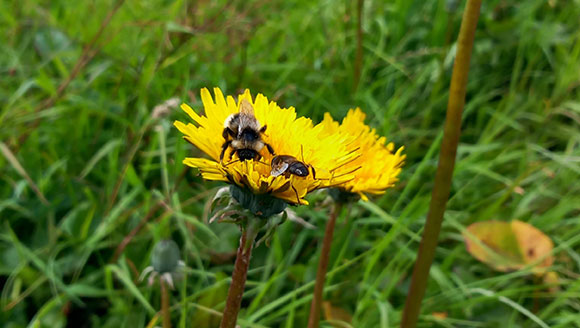Clare schools get with the biodiversity programme
Over 600 school students in County Clare have learned about the important role they can play in tackling the biodiversity crisis thanks to a new programme of educational workshops.

The students were taking part in the first ‘Clare Schools Biodiversity Programme’, an initiative for primary and secondary schools coordinated by Clare County Council’s Biodiversity Officer Barry O’Loughlin and funded by the Heritage in Schools Scheme (Heritage Council) and Creative Ireland (through Clare Libraries).
The programme saw Biodiversity Educational Specialists, Sinéad Keane and David McGrath, interacting with students through a series of workshops to raise awareness of biodiversity through creative learning in 11 schools across Clare during the months of September, October and November.
As part of the one-day workshops, students learned about the importance of biodiversity and the role they can play in protecting and enhancing the environment for wildlife.
Students had the opportunity to become involved in a range of activities such as working with nature and art, habitat identification, mapping of school grounds, installing a bird table and bird nest boxes, creating log piles for insects, identifying garden birds, and learning about pollinators and nectar sources.
The workshops were targeted at primary and secondary schools whose students are undertaking the theme of biodiversity as part of An Taisce’s Green Schools programme. They focused on steps that can be taken in schools to increase awareness of the importance of our natural heritage, including native plants, animals and habitats, and to increase species-richness on school grounds.
Clare County Council’s Biodiversity Officer, Barry O’Loughlin, said a key objective of the Clare Schools Biodiversity Programme is to help address Ireland’s biodiversity crisis by improving students’ understanding and knowledge of their natural environment.
“Ireland has seen a drastic decline in biodiversity in recent years with 85% of habitats and 30% of species (listed on the annexes of the EU Habitats Directive) listed as having ‘unfavourable status’. The fourth review of the conservation status of birds across the island of Ireland published in 2021 identified one-quarter of Irish birds on the ‘red list’ due to declines in breeding and wintering populations. It is therefore important that we work to increase awareness among people about the steps that can be taken to support biodiversity,” Mr O’Loughlin said.
He added, “Schools have the opportunity to play a vital role in promoting and preserving local biodiversity. I would like to thank and commend all of the participating schools for their engagement with this year’s programme, the biodiversity educational specialists for their hard work and commitment and the programme sponsors, which is a first for the county. We are already planning the next instalment of the Clare Schools Biodiversity Programme in 2024 and I look forward to welcoming schools back as well as bringing new schools on board.”
Biodiversity Educational Specialist, Sinéad Keane, said, “A lot of schools would be very interested in these workshops as they provide a valuable means to educating children about biodiversity in an effective, simple and fun way. Biodiversity is a word that children hear a lot about these days, but they have little understanding of its meaning. Following on from these biodiversity workshops children have a better understanding of the importance of biodiversity and how it relates to them and the natural world around them”.
David Quinn, Principal of Ennis Educate Together Primary School, said, “Our children’s enthusiasm was captivated through interactive workshops, focusing on native birds and trees in Ennis Educate Together NS’ local environment. They brought our school grounds to life as the children took particular attention to so many natural habitats all around them. The adventures the children have been on, since the class visits, have heightened their awareness and have inspired many new observations and conversations among the children as they continue to explore their surroundings for new discoveries.”
Clare County Council’s Biodiversity Officer Barry O’Loughlin added that it is hoped to roll out the workshops on a consistent basis and to encourage greater uptake in schools of the theme of biodiversity in order to achieve their Green Flag. To date, three participating schools have rebooked into the Clare Schools Biodiversity Programme for 2024, and it is expected that more schools in the county will get involved next year.
Supporting the Heritage Council’s Heritage in Schools Scheme and An Taisce’s Green Schools initiative is a key objective of the Clare Biodiversity Action Plan. Outreach programmes such as the Clare Schools Biodiversity Programme help to achieve this objective, and at the same time promote learning and development around biodiversity and support the Council’s work programme.
Page last reviewed: 06/12/23
Content managed by: Corporate Services Department
Back to topThis is just for feedback on our web site, not comments or questions about our services.
To tell us about anything else, go to our contact us pages.
